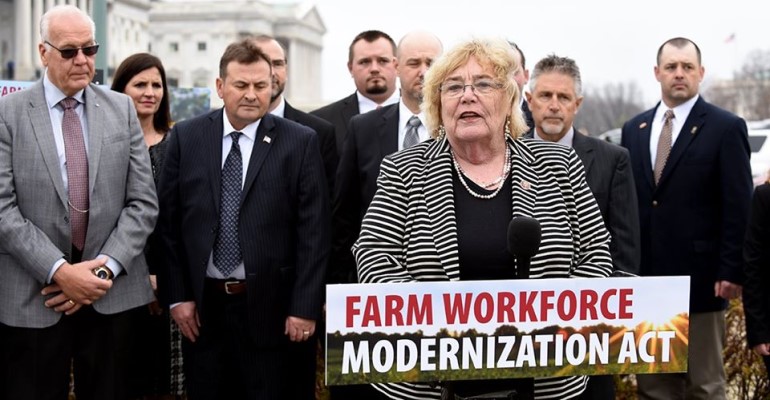
In mid-December, the U.S. House of Representatives passed bipartisan legislation -- the Farm Workforce Modernization Act -- to reform the U.S. immigration system for farmworkers in a bipartisan vote of 260-165. On Wednesday, calls came from supporters of the House legislation and agriculture industries to encourage the Senate to offer a bill that could be conferenced and eventually make it to the President’s desk.
At an event hosted by the National Potato Council (view event video here) during its legislative fly-in, which featured 130 potato growers and allied industry partners, many of the original bipartisan sponsors of the bill called on the Senate to show the same leadership as the House and work together to find a solution for agricultural workers. The Potato Council members met with a number of senators during their Capitol Hill visits and highlighted this priority, but Mark Szymanski, director of communications for the Potato Council, said he didn’t know of any public commitments made as of yet to take the lead in the Senate.
Rep. Zoe Lofgren (D., Cal.), a lead sponsor of the legislation, admitted, “Like any bill, I’m not going to say it’s perfect, but it’s pretty good.”
Rep. Jimmy Panetta (D., Cal.), who said he represents the Salad Bowl of the world, said what he loves about working with the agriculture industry is that it's not about working to find differences but, rather, to find similarities, and that’s how a cure was found for the agricultural workforce issue, which is the number-one issue for producers he represents on California’s Central Coast.
More than 300 dairy, agriculture, business and agriculture-allied organizations supported the House bill, while more than 80 immigration and labor advocacy organizations also supported the measure. An analysis by the Cato Institute estimated that the bill “would have saved H-2A farmers in 2019 about $324 million in labor expenses for H-2A workers alone.” The bill would “substantially reduce the illegal market for labor and increase agricultural production without harming U.S. workers,” the organization said. Additionally, the U.S. Chamber of Commerce stated that the bill “would take important steps to address the growing struggle of agricultural employers to meet their workforce needs.”
However, the American Farm Bureau Federation (AFBF) did not offer its final support for the bill, even after being at the table for the 8-10 months of work in the House. Republicans have their concerns but did find support in the House. Rep. Doug LaMalfa (R., Cal.) said the bill is “not about amnesty or immigration but about taking a narrow section of an issue and coming up with a solution.” LaMalfa also said it’s “inexcusable” to use election year politics as an excuse for inaction in the Senate.
Despite strong and bipartisan House support for farm labor reform, President Donald Trump is unlikely to sign a reform bill, now stalled in the Senate, if it reaches him, Agriculture Secretary Sonny Perdue said on Wednesday. As Perdue shared in December, the amnesty component is troublesome to this Administration.
At a time when American farmers are being tested at their very core, National Council of Farmer Cooperatives president Chuck Conner said the leadership offered by the House was bold and badly needed to start Congress down a path to a solution that offers greater farm prosperity when it is so desperately needed.
“We urge the Senate to begin its work,” Conner added. “At a time when many decry partisan gridlock in Washington, this issue provides a unique opportunity to make progress on a priority that is vital to all of us.”
Another lead sponsor of the bill, Rep. Dan Newhouse (R., Wash.), urged senators to “make it better -- perfect it so we can come together in a conference situation.” Newhouse added that agricultural labor is one of the most important issues facing the survivability of farmers and has been putting farmers out of business.
About the Author(s)
You May Also Like






